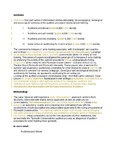Auditions and...

Date
2018-11Author
Subject
Metadata
Show full item recordAbstract
This is the second of a four-part series of interrelated articles discussing the pedagogical, ideological, and sociological functions of the audition process in drama school training. This article addresses the “callback” audition experience via the analytical framework of Actor Network Theory and with special reference to the construction of self-identities. In our work, we recognize that the canonical techniques of actor training associated with Stanislavski’s own practice and writings have resulted in a paradigm within the audition/callback process which, arguably, predominates within UK drama school training. This article makes some findings regarding the impact of this legacy upon callback audition “networks” and the actors within them. Taking its cue from the analysis of significant events of the audition process for the undergraduate Acting programme at the newly formed Plymouth Conservatoire–a drama school run jointly by Theatre Royal Plymouth and Plymouth University, the second article in the series investigates that dominant paradigm, aiming to offer an insight into the generic audition process in other HE institutions. As such, all papers in this series draw upon the authors’ own experience auditioning candidates for Plymouth Conservatoire, and for other drama schools, both in the UK and abroad, so as to uncover the various pedagogic, ideological, and sociological functions of auditioning for training. This article, however, focuses on the personal experience of a single drama school candidate–N–and their experience of callback at three different drama schools.
Collections
Publisher
Journal
Volume
Issue
Pagination
Recommended, similar items
The following license files are associated with this item:


